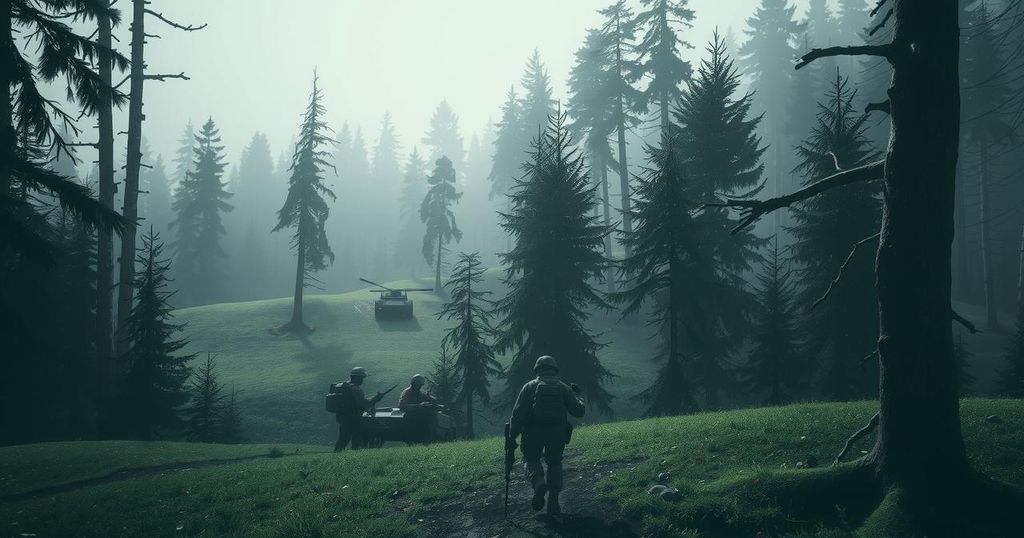Congolese Military Battles M23 Rebels Amid Rising Casualties and Humanitarian Crisis

The Congolese army is facing off against Rwanda-backed M23 rebels, who have captured Goma and led to over 700 deaths in a week. Despite reclaiming some villages, the military is weakened and facing serious humanitarian challenges, with the U.N. reporting extensive violence and rights abuses. Experts warn of the imminent threat to the provincial capital, Bukavu, and increasing displacement of vulnerable populations.
GOMA, Congo (AP) — The Congolese military is engaged in fierce combat against Rwanda-backed M23 rebels, who have rapidly advanced into the South Kivu province. According to United Nations reports, the conflict has resulted in approximately 700 fatalities since the beginning of the week. The rebels recently captured Goma, the province’s largest city, along with a key international airport, threatening additional strategic locations in the region.
In response to the ongoing conflict, the Congolese army successfully regained control of several villages, including Sanzi, Muganzo, and Mukwidja, which had been overtaken by M23 earlier in the week, as reported by civil society officials. However, the military is currently weakened, having sustained heavy casualties and lost several foreign mercenaries to the advancing rebels.
U.N. peacekeeping chief Jean-Pierre Lacroix indicated that M23 and their Rwandan allies are advancing towards Bukavu, the provincial capital, coming within 60 kilometers of the city. Lacroix noted the urgency of the situation, stating that the capture of an airport located just a few kilometers away would represent a significant escalation in the conflict.
M23 is one of over 100 militia groups in the eastern regions of the Democratic Republic of the Congo, an area rich in minerals critical for global technology markets. The group is reportedly bolstered by approximately 4,000 troops from Rwanda, suggesting a greater military capability than during previous conflicts in 2012.
The humanitarian implications of Goma’s capture have been dire. The city serves as a vital aid hub for the approximately 6 million people displaced by regional turmoil. The rebels have announced intentions to proceed towards Kinshasa, the nation’s capital, which is situated 1,600 kilometers to the west.
According to U.N. spokesman Stephane Dujarric, a recent assessment found 700 killed and 2,800 injured in Goma and surrounding areas within just a few days of conflict. Reports of human rights abuses, including extrajudicial killings, forced recruitment of civilians, and the occupying of schools and hospitals, have emerged amid the violence.
The Congolese military has faced allegations of sexual violence, with reports indicating that Congolese troops may have raped 52 women in South Kivu. This ongoing violence has impeded humanitarian operations, as emergency services have been effectively stalled since Goma’s capture.
Rose Tchwenko, the country director for Mercy Corps, emphasized the urgent need for aid, expressing concerns that the escalated violence could lead to increased displacement and further humanitarian crises, isolating vulnerable populations from critical assistance.
The Democratic Republic of the Congo has historically experienced instability, largely due to conflicts driven by ethnic tensions and competition for the region’s mineral wealth. The presence of numerous armed groups, including M23, reflects the complex social and political dynamics in the eastern provinces. The situation has escalated recently, particularly with foreign backing for certain rebel factions, prompting urgent humanitarian concerns amid high civilian casualties and mass displacements. The city of Goma has often been a focal point in past conflicts, serving as a strategic location for both military operations and humanitarian efforts. Its capture and the resultant humanitarian crisis underscore the delicate balance between military actions and civilian welfare in the region. The ongoing military engagement highlights the need for international attention to both the humanitarian and geopolitical dimensions of the conflict, as more than 6 million people in eastern Congo are in need of assistance due to continuous violence and instability.
The conflict in eastern Congo has reached alarming levels, particularly with M23 rebels seizing key locations and resulting in significant civilian casualties. The Congolese military is attempting to counter this aggression, but the situation remains precarious with humanitarian operations severely affected. The international community must address both the immediate humanitarian needs and the broader geopolitical implications of the ongoing conflict to prevent further loss of life and displacement among the population.
Original Source: apnews.com








